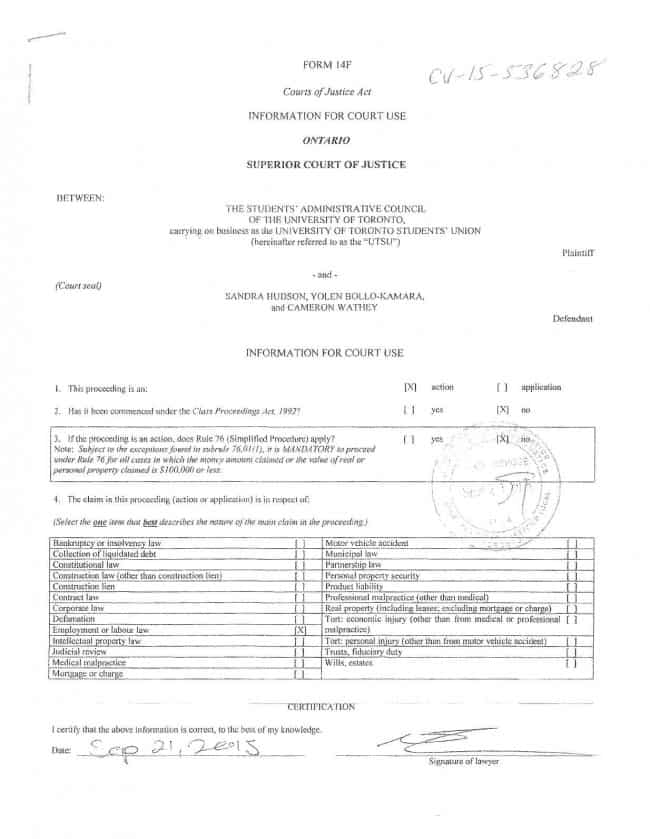On September 21, the University of Toronto Students’ Union (UTSU) commenced a legal proceeding against former UTSU president Yolen Bollo-Kamara, former vice president internal & services Cameron Wathey, and former executive director Sandra Hudson. According to a publicly available statement of claim, Hudson, Bollo-Kamara, and Wathey signed a termination agreement, in late April, which ended Hudson’s employment with the UTSU in her capacity as executive director. This agreement allegedly entitled Hudson to compensation in the amount of $247,726.40 “as a result of the UTSU’s decision to dismiss her.” This lump sum is equivalent to approximately 10 per cent of the UTSU’s operating budget.
Termination Agreement
The UTSU alleges that Hudson’s dismissal was without legal grounds. “At no time leading up to April 16, 2015, or at any point, did Bollo-Kamara, Wathey, or other members of the executive express dissatisfaction with the performance of Hudson,” reads a portion of the statement of claim. “All comments leading up to the change-over of the executive and counsel were positive regarding the performance of Hudson.”
The document goes on to note that at the April 23, 2015, meeting of the Board of Directors, Bollo-Kamara highlighted the efforts of Hudson as executive director and thanked her for her work over the year.
In addition to Hudson’s alleged dismissal compensation, Bollo-Kamara and Wathey also allegedly authorized cheques to pay Hudson for “1,974.5 hours of overtime which she herself had recorded in a single entry on April 1, 2015 after the [UTSU executive] election result was known.”
The UTSU claims that Bollo-Kamara authorized payments totalling $29,782.22, which were presented to be payments of overtime hours worked. The court file indicates that in her two-and-a-half years working as the UTSU executive director, Hudson had never recorded any overtime hours until that April.

Sandy Hudson was UTSU president between 2008 and 2010; chairperson of the Canadian Federation of Students-Ontario between 2010 and 2012, and UTSU executive director from 2012 to 2015. DAN EPSTEIN/THE VARSITY
Mutual release
Included in the termination agreement was a confidentiality provision, in addition to which a mutual release form was signed. The former could prevent the current UTSU executives from revealing the details of Hudson’s departure from UTSU. The latter has the potential to “release and forever discharge the UTSU” from “actions, causes of action, damages, claims, cross claims and demands whatsoever (including all damage, loss and injury not known or anticipated, but which may arise in the future and all effects and consequences thereof).”
The mutual release further states, “not to make or continue any claim or take or continue any proceeding against the UTSU Released Parties and the Employee Released Parties… with respect to the employment… or termination of the Employee’s employment.”
The release notes that it is “no admission whatsoever of liability on the part of the Employee Released Parties or the UTSU/SAC released parties and such liability is expressly denied.” However, the UTSU argues that this document, along with the Termination Agreement, was drawn up in “a joint effort to benefit Hudson” and “unfairly disregards the interests of the UTSU and its members.”
Ben Coleman, current UTSU president, spoke to The Varsity on background about the implications of the mutual agreement with respect to confidentiality. He said that it is legal to speak to anything in the statement of claim and that, since the mutual release is being challenged, it must be discussed in order to be challenged.
The UTSU argues that Hudson stole $126,809.15 from the UTSU when she granted herself the overtime hours and deliberately destroyed confidential information by erasing the hard-drive of the UTSU’s executive director’s computer. The UTSU ends their statement of claim by stating that Hudson’s actions, along with those of Bollo-Kamara and Wathey, were “egregious, outrageous, high-handed, in bad faith, and that punitive damages in the amount of $200,000 ought reasonably to be awarded [to the UTSU].”

Yolen Bollo-Kamara was the UTSU vice-president, campus life between 2012 and 2013; UTSU vice-president equity between 2013 and 2014, and UTSU president between 2014 and 2015. Jennifer Su/THE VARSITY
State of affairs
The UTSU circulated a press release in response to the release of the statement of claim, in which they defended their decision. “The UTSU is pursuing this course of action to ensure that its resources for serving students are protected and so that our members are not limited from informed participation in our union,” read a sentence in the release. “The allegedly improperly paid severance constitutes around a tenth of our operating budget, and so our decision to move forward is not motivated by a desire to discredit these individuals, but rather to keep the resources that students have paid to us and which we use to serve and advocate for them. In all aspects of how this is handled, the Executive Committee has taken great care to choose the most appropriate and reasonable way to address the situation.
Coleman discussed the circumstances that permitted the alleged issues to arise. He emphasized the importance of a professional relationship between the executive director and the UTSU executive in order to maintain a functional monitoring system.
When asked how these allegations came to light and what they mean for the future of the union, Coleman cited the UTSU’s internal controls. According to Coleman, the UTSU was able to request documents rapidly. He underscored the importance of holding elected officials accountable and said that, if the right questions are asked, things can be revealed.
On September 24, Bollo-Kamara stated that she had not received any official documents or information from the executive regarding the proceeding, but heard only through rumour that there is a case against her.
Hudson and Wathey did not respond to multiple requests for comment.

Cameron Wathey was the UTSU vice-president, internal & services, between 2013 and 2015. JENNIFER SU/THE VARSITY
Among the claims against the three individuals, are that they “acted in a manner that was oppressive, unfairly prejudicial to and unfairly disregarded the interest of the UTSU and its members,” as well as accusations that they “breached their fiduciary duty.” It is also alleged that they “conspired to commit civil fraud” and that their actions “constituted civil fraud.”
The UTSU alleges that it is “evident from the circumstances that Hudson did not wish to work with the incoming Executive Committee, and that Bollo-Kamara and Wathey, knowing that their responsibility for the UTSU’s finances were coming to an end, agreed to dismiss her in order to grant her the benefit of her extremely generous dismissal provisions.”
In terms of reaching a settlement, Coleman has stated that the UTSU would prefer an arbitration process, a sentiment echoed in the UTSU’s press release: “We are open to arbitration or mediation as a way of resolving the issue, and would prefer a non-court resolution, but the advice of our legal counsel was to follow this procedure of filing a claim. Although this is a substantial course of action, the Board and Executive Committee of the UTSU have a fiduciary responsibility to use its resources responsibly to serve students.”
The defendants have 20 days to prepare a statement of defence from the date of having been served the papers. All details reported here are from the statement of claim levelled against Hudson, Bollo-Kamara, and Wathey and remain allegations until court proceedings are completed.


